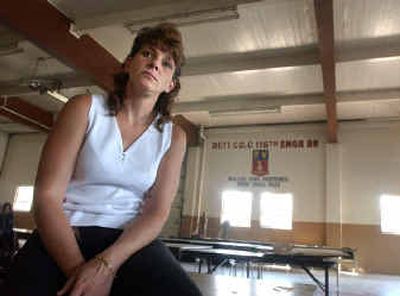Guard reassures families on leave

As North Idaho National Guard soldiers prepare to spend a year in Iraq, here is what that means:
Turning off the TV and playing Cinderella dress-up with a 4-year-old. Learning to kick open doors and conduct house-to-house searches without getting shot. Bucking 10 tons of hay bales for the first time.
The citizen soldiers in Idaho’s 116th Brigade Combat Team continue to prepare for a year’s deployment in Iraq, and are now six weeks through a four-month stint of combat training at Fort Bliss, Texas.
Spouses and family members in North Idaho have been busy raising funds for calling cards and care packages, all the while dealing with life when a significant other is out of reach.
Brigade commanders announced Tuesday that the 2,000-plus soldiers in the 116th will be allowed to go on leave before the unit ships out for Iraq, now scheduled for November or December.
“The policy is we make time for families before deployment,” Capt. Monte Hibbert, deputy public affairs officer with the 116th said from Fort Bliss on Wednesday. Rumors and speculation that there would be no leave prompted the announcement from Brig. Gen. Alan Gayhart, Hibbert said.
“Spouses were concerned they might not get leave, so we wanted to quell that and send the true command message out there that (leave) is a priority,” Hibbert said. The Pocatello man, who teaches biology at Idaho State University and publishes a bilingual newspaper with his wife, added, “We all desire to spend some time with our families.”
The soldiers will head to Fort Polk, La., in mid-October for what Hibbert called a sort of “final exam,” where the brigade with be tested for combat readiness. Leave would come after that, though not for every soldier at the same time, and could last as long as two weeks.
“We’ll believe it when we see it. Stories fly around so much and then change,” Cherie Kearby said. Kearby said she and other spouses of deployed soldiers will “wait for the day when they say ‘Honey, I’ve bought my plane ticket and I’m on my way home.’ ”
Leave would be a respite for the citizen soldiers in Idaho’s 116th Brigade Combat Team. The men and women, mostly from Idaho but with some from as far away as Pennsylvania, have been toiling in 100-degree heat for about six weeks, learning how to spot ambushes and how to deal with irate crowds at checkpoints and how to do house-to-house searches without getting killed.
Back at home, meanwhile, Jeannie Morgan keeps the TV turned off more than she used to.
“I’ve got three kids, 4, 7 and 9,” Morgan said. “And my TV doesn’t go on unless it’s PBS — ‘Clifford’ or ‘Sesame Street.’ They all know their daddy is going overseas. I don’t want them to hear, ‘Oh my gosh! Six soldiers died today.’ They have enough stress. I want them to be kids.”
That means monitoring a game of Cinderella dress-up with her youngest daughter even while on the telephone. It means trying to form play groups with the children of other soldiers so her kids can hang out with other kids who have dads training in Texas, training for their year in Iraq.
And having a spouse prepping for a year ovearseas means Kearby will be dealing with hay bales and cordwood again next summer. Along with fences for her pasture and roofs for her mostly completed horse stalls.
The deployment of the 116th caught Kearby and her husband and their kids as they had barely moved into a new place. Married a year, Cherie Kearby had just gotten three horses and was looking forward to living in a little slice of country paradise.
“I didn’t expect them to say, ‘Now you have to go to war, sorry dear.’ I had to haul 10 tons of hay. I ended up with 10 cords of firewood,” Kearby said. “Right now we’re all going through the same phase: OK, your husband is gone, but your husband is only in Texas and if it comes right down to an emergency, your husband could be home in a day.”
And both Morgan and Kearby said neighbors throughout North Idaho have stepped forward to help with chores that might seem too big to tackle alone, to donate money to the various funds for children and calling cards, to help with a food bank for military families.
And in the green of North Idaho and the brown of west Texas, pens are set scratching against paper.
“The biggest thing to those guys over there is a piece of paper. A letter that just says I love you means the world to that soldier,” Kearby said.